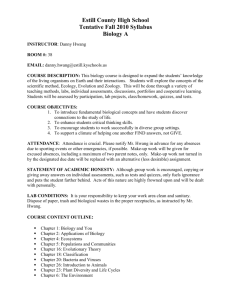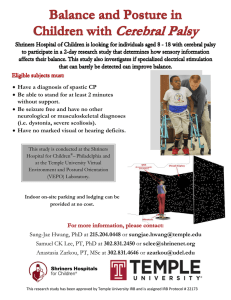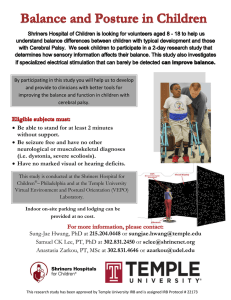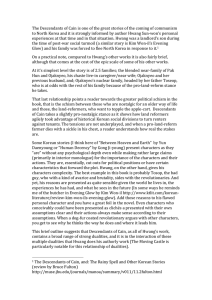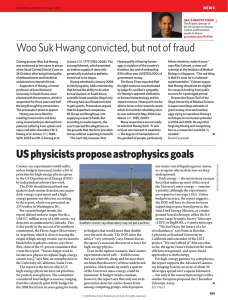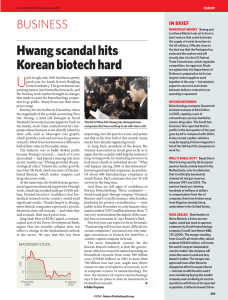The Integrator New Professorships Established by Hwang Family The Research Will Advance
advertisement
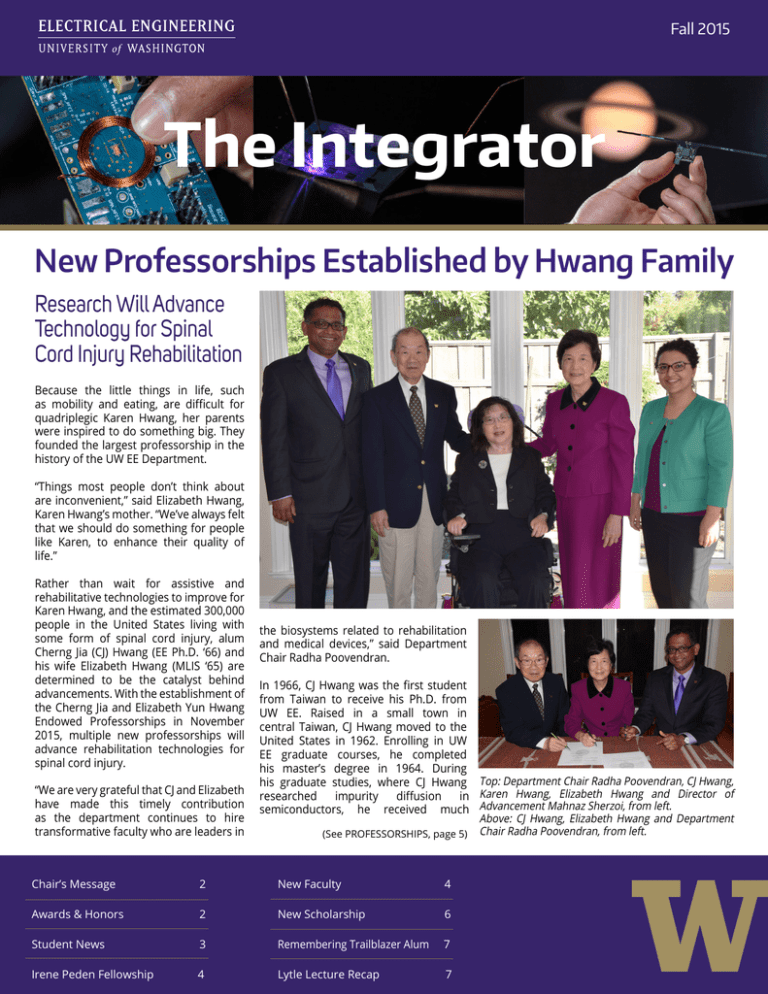
Fall 2015 The Integrator The New Professorships Established by Hwang Family Research Will Advance Technology for Spinal Cord Injury Rehabilitation Because the little things in life, such as mobility and eating, are difficult for quadriplegic Karen Hwang, her parents were inspired to do something big. They founded the largest professorship in the history of the UW EE Department. “Things most people don’t think about are inconvenient,” said Elizabeth Hwang, Karen Hwang’s mother. “We’ve always felt that we should do something for people like Karen, to enhance their quality of life.” Rather than wait for assistive and rehabilitative technologies to improve for Karen Hwang, and the estimated 300,000 people in the United States living with some form of spinal cord injury, alum Cherng Jia (CJ) Hwang (EE Ph.D. ‘66) and his wife Elizabeth Hwang (MLIS ‘65) are determined to be the catalyst behind advancements. With the establishment of the Cherng Jia and Elizabeth Yun Hwang Endowed Professorships in November 2015, multiple new professorships will advance rehabilitation technologies for spinal cord injury. “We are very grateful that CJ and Elizabeth have made this timely contribution as the department continues to hire transformative faculty who are leaders in the biosystems related to rehabilitation and medical devices,” said Department Chair Radha Poovendran. In 1966, CJ Hwang was the first student from Taiwan to receive his Ph.D. from UW EE. Raised in a small town in central Taiwan, CJ Hwang moved to the United States in 1962. Enrolling in UW EE graduate courses, he completed his master’s degree in 1964. During his graduate studies, where CJ Hwang Top: Department Chair Radha Poovendran, CJ Hwang, researched impurity diffusion in Karen Hwang, Elizabeth Hwang and Director of semiconductors, he received much Advancement Mahnaz Sherzoi, from left. Above: CJ Hwang, Elizabeth Hwang and Department (See PROFESSORSHIPS, page 5) Chair Radha Poovendran, from left. Chair’s Message 2 New Faculty 4 Awards & Honors 2 New Scholarship 6 Student News 3 Remembering Trailblazer Alum 7 4 Lytle Lecture Recap 7 Irene Peden Fellowship MESSAGE FROM THE CHAIR STUDENT NEWS Spreading Solar Power Dear Alums, With the start of another academic year, I am reminded that our department couldn’t be where it is today without our alumni support. Building on the success of the past year, during which we were ranked the #18 best graduate school for 2016 by U.S. News & World Report and led entrepreneurship efforts across campus with the most startups, another outstanding year is taking shape. Much of what we have to be proud of is, in fact, thanks to our exceptional alums. I am extremely pleased to announce new endowed professorships, established by alum CJ Hwang and his wife, Elizabeth, which support research in spinal cord injury rehabilitation technology. The generosity of the Hwangs provides a fantastic opportunity for UW EE to expand research into biomedical devices and systems. By leveraging the professorships, I look forward to attracting and retaining world-class faculty and building a strong research program in this area. Earlier this year, alum Tom Doyle (BSEE ’64) established an endowed scholarship for electrical engineering students. A recipient of numerous scholarships during his academic career, Tom decided to pay it forward and help a new generation of students. Allowing students to focus on their studies, and not worry about finances, opens many doors. Thank you, Tom, for your foresight and your generosity. The first annual Bay Area Alumni Event in September 2015 proved to be a resounding success. Well-attended by more than 75 alums, the event was an excellent opportunity to connect with our alums living in California. Outside of Seattle, the Bay Area boasts the next largest number of UW EE alums. Based on the success of this year’s event, we are committed to hosting an annual gathering for Bay Area alums. If you missed this year’s alumni event, I hope you will join us next year. Planning is also under way to organize an event for Washington, D.C. alums. We are also proud of our students, who are not only the next generation of engineers, but also the next generation of UW EE alums. Our vision to Develop Tomorrow’s Leaders in Electrical Engineering Innovation continues to take shape. This newsletter contains stories about outstanding students who are already making a difference by applying the skills they’ve learned in UW EE to such endeavors as founding start-ups and working to spread solar power across the UW campus. Our current students are also benefiting from the wisdom of EE alums. EE senior Shruti Misra works to implement solar energy on campus EE senior Shruti Misra is, quite simply, using her own energy to conserve energy. A volunteer with UW Solar, Misra is working to spread solar power across UW campus, with the goal of reducing dependence on the electrical grid. EE Professor and Chair Radha Poovendran, second from left, attends the SEIEE International Forum for Young Scholars in Shanghai in October 2015, as a keynote speaker. “This type of work motivates me because it’s fast paced and I learn something new every day,” Misra said. “More importantly, it allows me to be a part of something that makes a visible and sustainable difference on campus.” Thanks to feedback from alums during my first year as chair, we are building on our department’s strengths in system design and entrepreneurship with the launch of a new Senior Capstone Design option. Starting in winter quarter 2016, the new capstone option will enable students to work in teams on industry sponsored projects. The effort will ensure that all students with an entrepreneurial spirit can learn the skills they need to develop the next generation of products and start-ups. Misra has been involved in UW Solar since early 2015. UW Solar is a student-run interdisciplinary team of students who volunteer their time to work with UW Housing and Food Services to encourage and implement solar panel installation on buildings across campus. The volunteers also provide outreach to students regarding the benefits of solar power. Founded in 2012, the organization has already installed solar panels on the roof of the Mercer Court dorms. I hope you enjoy this edition of The Integrator and continue to stay involved and connected to UW EE. Our success as a Department is the result of the hard work, innovative ideas and collaborative spirit of the UW EE community, namely the faculty, staff, students and alums who are the heartbeat of the department. Thank you for your dedication to making our department one of the best. I look forward to continued conversations with our alums in coming months on how to make UW EE a premier, world-class department. “We have a bunch of other projects in the pipeline,” Misra said. “We are growing a lot and are in demand.” One major project that Misra is involved in is placing solar panels on the roof of Agua Verde, a Mexican restaurant near campus. The project is in the early stages and is expected to be completed early next year. Misra’s work with UW Solar is on the project management (See SOLAR, page 5) Yours truly, Start-up Success Radha Poovendran Professor & Chair Grad student co-founds WiBotic start-up Ph.D. student Ben Waters doesn’t have to worry about filling out job applications when he finishes his Ph.D. degree this fall. That’s just one perk of being CEO of a startup he co-founded. AWARDS & HONORS Intel Early Career Award Arka Majumdar Assistant Professor Arka Majumdar, who has a joint appointment in Electrical Engineering and Physics, is one of three recipients of a 2015 Intel Early Career Award. The award supports Majumdar’s research on optical sensing using silicon photonics, which has the potential to reshape the future of image sensors by integrating optical computing with sensors. 2 The Integrator Vol 11:1, Fall 2015 EE senior Shruti Misra volunteers with UW Solar to install solar panels on buildings across the UW campus and beyond. “This is definitely a dream of mine,” Waters said. “I’ve always been excited about building a product and a team of people working together.” UW EE’s 25th IEEE Fellow Scott Hauck Professor Scott Hauck is the 25th UW EE faculty member to be elected an Institute for Electrical and Electronics Engineers Fellow. Hauck is honored for his contributions to Field-Programmable Gate Array (FPGA) based systems. FPGAs are chips that can be programmed and reprogrammed to implement complex digital logic. Ben Waters co-founded WiBotic during his final year of graduate school. Waters co-founded a start-up called WiBotic with Professor Joshua Smith in the Sensor Systems Lab. The idea for WiBotic surfaced during Waters’ final year of graduate school while he was working on a wireless power system for medical purposes and was contacted about developing wireless power for robots. “Josh’s lab has made a name for itself in wireless power and companies began to reach out regarding wireless power for robots,” Waters said. Together with Smith, Waters designed a wireless charging system specifically for robots, which alleviates the need for robots to be plugged in or dock in a specific place. With the wireless system, robots simply need to be in close proximity to a charging station to charge their battery. While there are other wireless power companies in the market, WiBotic is the first to focus specifically on robots. WiBotic specializes in three types of systems: (See START-UP, page 6) The Integrator Vol 11:1, Fall 2015 3 DEPARTMENT NEWS Irene Peden Endowed Fellowship Supports Next Generation of Women Engineers At 90 years old, Professor Emerita Irene Peden has not only seen the field of engineering change when it comes to women in the field— she has led the change. In celebration of Peden’s 90th birthday, and the culmination of a successful fundraising campaign to establish an endowed fellowship for electrical engineering women in her honor, more than 25 of Peden’s former Ph.D. students, colleagues and friends gathered for a celebration on Friday, October 2, 2015. Professor Emerita Irene Peden, the first woman faculty hired by the UW College of Engineering. “What is important about Irene and other trailblazers is how life is easier for the women who follow them,” said Eve Riskin, EE Professor and College of Engineering Associate Dean for Diversity & Access. A trailblazer for women in engineering, Peden was the first woman hired by the University of Washington College of Engineering in 1962. During her career, Peden was a leader in the effort to involve women in professional engineering careers, brought equal pay issues to the forefront and inspired many women to join the department. While pursuing graduate work at Stanford University, Peden was one of three women to earn a master’s degree. Of the three women, she was the only one who went on to pursue her Ph.D., becoming the first woman to receive a doctorate degree in engineering from Stanford University. Despite her advanced education, Peden struggled to find a job as many universities had never before hired a woman. During her career at UW, Peden served as Associate Dean of the UW College of Engineering and Associate Chair of the Department of Electrical Engineering. Peden’s research interests focused on geophysical subsurface remote sensing, radio science, electromagnetic wave scattering and propagation. In 1970, she was the first woman engineer/scientist to conduct fieldwork in the interior of the Antarctic continent as a Principal Investigator. Among many honors, Peden is one of only two UW EE faculty admitted into the National Academy of Engineering in the past 100 years. The Society of Women Engineers conferred its highest honor, the Achievement Award, upon her in 1973, citing her contributions to radio science and her activities in education. Leading Lady Thanks to Professor Emerita Irene Peden’s pioneering efforts in the 1960s, UW currently leads the nation in women engineering faculty with 22% women faculty. The national average is 14.5%. UW EE Welcomes New Faculty PROFESSORSHIPS The UW EE community is pleased to welcome two new faculty members to the department: assistant professors Eli Shlizerman and Lillian Ratliff, who work in the areas of big cyber physical data and computing. Shlizerman joined the department this fall and Ratliff arrives in fall 2016. guidance from his advisor, Dr. Lynn A.K. Watt. Eli Shlizerman Data analysis expert and Washington Research Foundation Professor Eli Shlizerman, who joined the UW Department of Applied Mathematics three years ago, assumed a joint tenure-track appointment in Electrical Engineering this fall. Shlizerman decided to join UW EE due to the department’s strengths in signal processing, networks, smart devices and biorobotics, which all relate to his research. “I am looking forward to collaborating with EE faculty in networks, signal processing and biorobotics to create bio-inspired devices that mimic and implement the 4 The Integrator Vol 11:1, Fall 2015 networks that Shlizerman said. I Left: Irene Peden with her first Ph.D. student George Webber (Ph.D. ‘71) and his wife, Susan. The Webbers traveled from Washington, D.C. to attend the event. (Continued from page 1) study,” Education • Ph.D. Computer Science & Applied Mathematics, Weizmann Institute of Science, 2009 • M.Sc. Computer Science & Applied Mathematics, Weizmann Institute of Science, 2004 • B.Sc. Computer Science and Mathematics, Bar-Ilan University, Israel, 2002 Far Left: More than 25 colleagues, students and friends of Professor Emerita Irene Peden attend the celebration. Following graduation, CJ Hwang accepted a position with Bell Laboratories in Murray Hill, N.J., where he worked on semiconductor laser research and development. During his seven years at Bell Labs, CJ Hwang designed the first long-life lasers. In 1973, he accepted a position with Hewlett Packard Laboratories and worked on the development and applications of semiconductor lasers. Eli Shlizerman Researches complex dynamic networks, such as the nervous system. Lillian Ratliff A researcher studying the smart grid and smart urban spaces, Lillian Ratliff will join UW EE in fall 2016 after completing a year of postdoctoral research at the University of California, Berkeley, where she received her Ph.D. In addition to providing an ideal environment for her research and a strong academic program, the UW’s focus on Lillian Ratliff Researches the smart grid and smart urban spaces. diversity was also important to Ratliff, who notes the strong contingent of women faculty. “Given the particularly progressive nature of the city of Seattle, for my particular research focus I am not sure there is a better place to be,” Ratliff said. “I am looking forward to collaborating with the (See NEW FACULTY, page 6) Motivated to start his own business, CJ Hwang went on to found three companies during his career: General Optronics Corp, which was the world’s first semiconductor laser manufacturer; Applied Optronics Corp, the world’s first company producing high power semiconductor lasers and subsystems for medical surgical applications; and Optronics International Corp, the first Taiwanese company developing and commercializing semiconductor lasers and subsystems for high-speed fiber optic communications. CJ Hwang holds three patents, two from the U.S. and one from Taiwan. During his career, CJ Hwang published 52 technical papers in various widely respected journals, such as the Journal of Applied Physics and the Physical Review. From 1994 to 2003, CJ Hwang served as a member of the review board for the Division of Engineering, National Science Council, in Taiwan. He was also listed in many issues of Who’s Who and American Men and Women In Sciences from 1979 to 1994. SOLAR (Continued from page 3) side, allowing her to learn new skills in addition to the technical skills she has honed in EE class projects. By interacting with clients and contractors, she learns how large-scale projects are implemented. “A lot of the EE basics definitely helped me along the way,” Misra said. “And, this experience taught me a lot of skills that can be used in future classes or projects.” This past summer, Misra worked at Athena Energy, a start-up based in Seattle that develops solar inverters that provide both power backup and grid tie capabilities. While working there she was involved with various projects, including researching and working on developing a smart network of power outlets for homes, along the lines of a nano grid. Following graduation, Misra is deciding between going to graduate school or working in industry. Whatever route she takes, she will be well-prepared. The Integrator Vol 11:1, Fall 2015 5 ALUMNI NEWS Alum Tom Doyle Establishes Student Scholarship Remembering Trailblazer Alum Hemant Sonawala EE Alum Tom Doyle (BSEE ’64) knows what it feels like to receive scholarships. And now, he also knows what it feels like to financially support students. In June 2015, Doyle established an endowed scholarship for electrical engineering students. UW EE Alum Hemant Sonawala (MSEE ‘61) had a strong belief in three things: India, himself and others, which led to numerous accomplishments during his lifetime. A visionary and a pioneer in India’s technology industry, Sonawala passed away peacefully from cardiac arrest on May 30, 2015, at the age of 78. “I’ve established the endowment in gratitude for scholarship assistance I received while pursuing a bachelor’s degree in EE at the University of Washington, and for the fulfilling career opportunities such an education can provide,” said Doyle. Scholarship awards covered Doyle’s undergraduate tuition and a part-time position with the Boeing Company helped cover expenses and provided valuable work experience. After graduating with his bachelor’s degree from UW, Doyle attended graduate school at Stanford University with the help of a National Science Foundation Fellowship. After receiving his MSEE degree in 1965, he worked at Bell Laboratories in New Jersey, pursuing a career in systems engineering and network planning. In 1984, Doyle transferred to Bell Communications Research, a new company supporting the divested local telephone companies. NEW FACULTY (Continued from page 3) amazing faculty in EE as well as across the department of engineering and campus.” Education • Ph.D., Electrical Engineering and Computer Sciences, University of California, Berkeley, 2015 • M.S. Electrical Engineering, University of Nevada, Las Vegas, 2010 • B.S., Electrical Engineering, University of Nevada, Las Vegas, 2008 Sonawala was a technology entrepreneur in India during an era when private entrepreneurship was not looked highly upon due to Nehruvian socialism, which gave the state control of all aspects of the economy and made it difficult for private companies to operate. Despite this, Sonawala was determined to lead efforts to locate hardware manufacturing in India. UW EE alum Tom Doyle (BSEE ‘64) with Department Chair Radha Poovendran, from left. Eli Shlizerman’s Research Eli Shlizerman’s research focuses on analyzing complex dynamic networks, such as the nervous system. Since such networks are typically challenging to study due to their complex structure, Shlizerman developed analysis methods that fuse data analysis with dynamical system theory, which uses various equations to determine the behavior of complex systems. By analyzing the fundamental properties of the nervous systems, Shlizerman hopes to mimic the design in the development of bio-inspired systems. Lillian Ratliff’s Research Lillian Ratliff’s research is focused on developing tools to solve problems in largescale sociotechnical systems including the smart grid, intelligent transportation, healthcare systems and smart urban spaces. To develop these tools and methods, she uses a combination of game theory, control theory, statistical learning and optimization. For her research on smart urban spaces, Ratliff is particularly interested in utilizing data to better understand the dynamics of expanding city centers. START-UP (Continued from page 3) mobile, underwater and aerial robots. Each system has unique requirements, such as size and shape. “The goal for WiBotic is to keep up with the rapidly growing robotics market, and to enable systems of robots to scale with reliable wireless power supplies,” Waters said. “As the world of human and robot interaction grows, we want to make it seamless and reliable.” Once the system was designed and a prototype was ready, things moved quickly. After the business incorporated in early 2015, seed funding was secured from the W Fund, which makes early stage investments in promising technologies. Office space was secured a few months later. WiBotic is currently housed in Fluke Hall, where they 6 The Integrator Vol 11:1, Fall 2015 have office and lab space as part of CoMotion’s incubator program, which supports start-ups in the early stages of development. In addition to Waters, who will work at WiBotic full-time following the completion of his Ph.D. in fall 2015, the company has several interns and independent contractors on staff. From product development to learning about the administrative side of being a business owner, Waters says he enjoys it all. UW resources were helpful for making the process seamless and keeping things progressing, he said. “I really enjoyed taking technology from research to a product very quickly,” Waters said. the University of Washington and working at Boeing and Tektronix, Sonawala returned to his native Mumbai, India. Upon his return, Sonawala founded Hinditron in 1966, which offers technology based solutions and consultancy in various areas such as information technology, instrumentation, telecommunication and infrastructure. The company’s motto is “Better Life Through Technology.” Sonawala also founded Digital Equipment India, which became part of HP India in 1988. Digital Equipment India was the first technology based Initial Public Offering in India. In honor of his many achievements, Sonawala received Dataquest’s Lifetime Achievement Award in 2005. In addition to being remembered as one of the fathers of India’s Computer and hi-tech industry, Sonawala will also be remembered as a mentor to many who are in senior positions in India’s technology industry, said his son. Alum Hemant Sonawala (MSEE ‘61) “He was a perfectionist and had a strong belief in himself, as well as a belief in technology as the only method of transforming India,” said Sonawala’s son, Saurabh Sonawala, also a UW EE alum (MSEE ’88). “He had the ability to take calculated risks and to recover from reverses and, most importantly, he had the guts to back his vision.” After spending several years in the United States while attending “The list of people who consider that they owe their success, at least in part, to the lessons learnt from him, is very long,” said Saurabh Sonawala. Lytle Lecture Speaker David Tse, from Stanford, Draws a Crowd Describing this year’s Lytle Lecture as informative would be entirely accurate. Information theory was the focus of Professor David Tse’s general audience talk at the annual Dean W. Lytle Endowed Lecture Series on November 2, 2015, attended by more than 175 students, faculty and alums. A leading researcher in information theory from Stanford University, Tse explained how information theory, the science behind the engineering of all modern-day communication systems, has enabled new technological innovations. For example, algorithms and codes led to the proliferation of cell phones. While developed in the context of communication, information theory can be applied to other fields as well, such as computational biology. The annual lecture is a tribute to Dean Lytle’s 40-year career at UW and his cohort of friends and colleagues who inspired and guided students. If you missed this year’s event, videos from the general audience and technical colloquium lectures are available at www.ee.washington.edu/news/lytle_lecture.html. Professor David Tse, from Stanford University. Right: More than 175 people attend the general audience lecture on November 2, 2015. Left: The Lytle family, including Dean Lytle’s wife Marilyn and daughters, with Department Chair Radha Poovendran and Professor David Tse. The Integrator Vol 11:1, Fall 2015 7 The Paul Allen Center—AE100R Campus Box 352500 Seattle, WA 98195-2500 www.ee.washington.edu | 206.221.5270 To learn about supporting EE, please call 206.685.1927, or visit www.ee.washington.edu/supportee First Annual Bay Area Alumni Event a Success Bay Area alums get an A for attendance! The first annual Bay Area UW Electrical Engineering Alumni Event was wellattended by more than 75 alums on Thursday, September 17, 2015. The event provided an opportunity for the large number of alums living in the Bay Area to network with one another and meet new Department Chair, Radha Poovendran. Held at the Computer History Museum in Mountain View, Calif., attendees enjoyed refreshments, a raffle drawing, and an opportunity to meet UW EE faculty members in attendance, including Payman Arabshahi, Matt Reynolds, John Sahr and Blake Hannaford. If you missed this year’s event, we look forward to seeing you next year! Radha Poovendran Professor & Chair Matt Reynolds Associate Chair for Research and Entrepreneurship Payman Arabshahi Director of Advancement Daniel Kirschen Associate Chair for Education and Entrepreneurship Jenq-Neng Hwang Associate Chair for Global Affairs and International Development Brooke Fisher Public Information Specialist Contributors Mahnaz Sherzoi, Kelly Williams Send address corrections to: alumni_relations@ee.washington.edu
